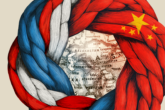September 20, 2022
China Hit Some Bumps on Its Road to Semiconductor Dominance
Don’t be lulled into thinking China is failing in its goal to become the world’s biggest semiconductor-chip producer. That’s the conclusion some are drawing from such troubles as the bankruptcy of national champion Tsinghua Unigroup and the high-profile arrests of several officials and executives. If China is failing, the argument goes, why is Washington launching an expensive industrial policy to subsidize domestic semiconductor manufacturing? This analysis is emblematic of the Western habit to underestimate the strength and resilience of China’s economy, political system and industrial strategies.
China’s statist approach suffers from endemic waste, misallocation of capital and corruption. China isn’t guaranteed to succeed simply because Beijing wants to.
But the notion that these arrests and bankruptcy signal China’s failure lacks evidence.
Consider the solar and shipbuilding industries. Similar to semiconductors, solar technology was invented and first commercialized in the U.S., only to be targeted later by China’s state planners. In 2012, after years of massive subsidies and overinvestment, China’s largest solar firms began to suffer high-profile setbacks. Trina and others cut production to maintain profitability. LDK Solar and others were bailed out by local governments while defaulting on foreign bonds. Suntech, the Nasdaq-listed darling of China’s solar sector, went bankrupt in 2013. Fast-forward to the present, however, and China’s solar industry is so dominant that U.S. and European green-energy goals depend on Chinese exports.
Read the full article from The Wall Street Journal.
More from CNAS
-
The Future of Russia and China in Central Asia
Despite the many proclamations that Russian and Chinese interests would collide in Central Asia, Moscow and Beijing continue to work together in service of their shared object...
By Andrea Kendall-Taylor & Jim Townsend
-
Russia and China in Central Asia
Executive Summary Despite the many proclamations that Russian and Chinese interests would collide in Central Asia, Moscow and Beijing continue to work together in service of t...
By Andrea Kendall-Taylor, Lisa Curtis, Kate Johnston & Nathaniel Schochet
-
‘Trump Will Use His Strength For Peace': Ex White House Official
Lisa Curtis, Director of Indo Pacific Security Program at the Centre For A New American Security, says that in his second term, Donald Trump has learnt to be careful with his ...
By Lisa Curtis
-
Trump vs. Harris: Who Holds The Edge On Election Eve? Discussing With Lisa Curtis
CNBC-TV18 spoke to Lisa Curtis, from the Indo-Pacific Security Program at the Center for a New American Security, to examine the key election trends as the U.S. presidential r...
By Lisa Curtis




